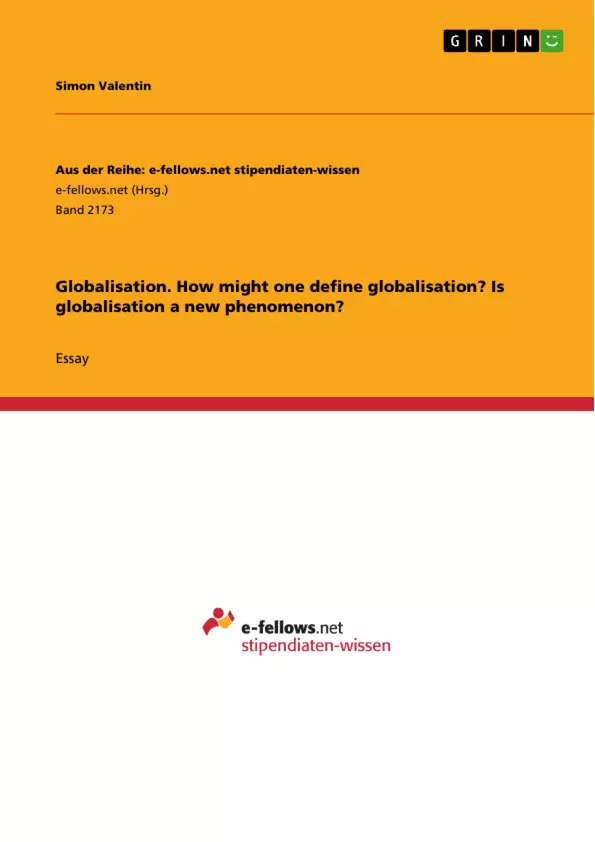Every day we perceive an innumerable amount of information about incidents from all over the world. It seems that more and more even the most distant events have an influence on our life. One word, one concept is related to all of them: globalisation. Be it the globalised financial system, globalisation of terrorism since 9/11 or cultural globalisation. Everything is tried to be explained with that term.
But what actually is globalisation? Where does it come from? Is it all in all something good or something bad? And can we influence it? In this essay, I want to examine the basic principles of globalisation and define the term according to these questions.
Table of Contents
- Essay Globalisation
Objectives and Key Themes
The objective of this essay is to examine the basic principles of globalization, define the term, and explore its historical context and implications for the future. The essay seeks to understand whether globalization is a recent phenomenon or a continuous process throughout human history, and to assess its positive and negative aspects.
- Defining Globalization
- Historical Perspectives on Globalization
- The Impact of Globalization on the World Order
- Globalization as a Continuous Process
- The Future of Globalization
Chapter Summaries
Essay Globalisation: This essay delves into the multifaceted concept of globalization, questioning its origins, nature, and consequences. It challenges the notion of globalization as a solely recent phenomenon, arguing instead for a long-term perspective, tracing its roots back through history. The essay examines diverse interpretations of globalization from economic, political, and sociological viewpoints, highlighting the lack of consensus surrounding its definition and starting point. Through a review of existing literature, the essay explores various historical events and periods that have contributed to the ongoing process of global integration. The author ultimately concludes that globalization, as a process of worldwide integration driven by the exchange of goods, cultural elements, ideas, and worldviews, is neither inherently good nor bad, but rather its value depends on how humanity manages it in the future.
Keywords
Globalization, global integration, historical perspectives, economic globalization, political globalization, sociological globalization, world history, human development, global interconnectedness, future implications.
Essay Globalisation: Frequently Asked Questions
What is the purpose of this essay?
The essay aims to examine the fundamental principles of globalization, provide a clear definition, and explore its historical context and future implications. It investigates whether globalization is a recent phenomenon or a continuous process throughout history and assesses its positive and negative aspects.
What are the key themes explored in the essay?
Key themes include defining globalization itself, exploring historical perspectives on globalization, analyzing its impact on the world order, considering globalization as a continuous process, and speculating on the future of globalization.
What are the main topics covered in the essay?
The essay delves into the multifaceted nature of globalization, questioning its origins, characteristics, and consequences. It challenges the idea of globalization as a recent development, offering a long-term historical perspective. It examines diverse interpretations from economic, political, and sociological viewpoints, highlighting the lack of a universally agreed-upon definition and starting point. The essay reviews historical events contributing to global integration and ultimately concludes that globalization's value depends on future human management.
What is the essay's conclusion regarding globalization?
The essay concludes that globalization, as a process of worldwide integration driven by the exchange of goods, cultural elements, ideas, and worldviews, is neither inherently good nor bad, but its value depends on how humanity manages it in the future.
What are the keywords associated with this essay?
Keywords include Globalization, global integration, historical perspectives, economic globalization, political globalization, sociological globalization, world history, human development, global interconnectedness, and future implications.
- Quote paper
- Simon Valentin (Author), 2016, Globalisation. How might one define globalisation? Is globalisation a new phenomenon?, Munich, GRIN Verlag, https://www.grin.com/document/343719




